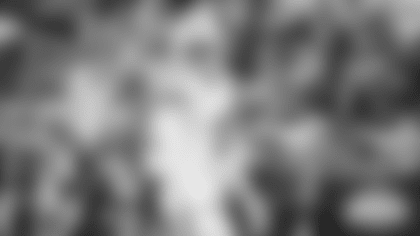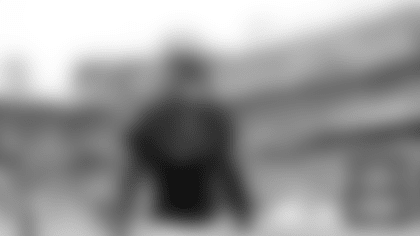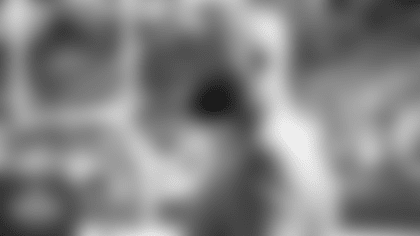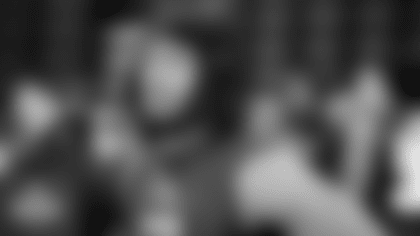General Manager Scot McCloughan addressed the Draft and other issues when he took the podium at the NFL Combine.Q: On the 49ers quarterback situation…
A: From the standpoint of who is under contract with us with Shaun Hill and Alex Smith of course, both are both under contract. Everybody is well aware of the Alex Smith situation. Discussions have been ongoing with the player with his representation and they've been very positive. We're going to keep going forward with it and we hope to get something done from an organizational standpoint with Alex. We'd like to have him back. There's a value to have him back right now and I think both parties are aware of that. That's the way we're approaching it. I'm excited about the way it's gone so far. I'm very excited about how Shaun Hill finished the season and how his teammates believe in him. He proved that he can make plays down the line late in games to help us win and put us in the position to win. The open competition, I respect. I think you have to have that until for sure you have a proven commodity year in and year out who can do it day in and day out and we're working our way in that direction. I'm positive about it. I think it's important to get Alex back again, because I think at his age, he has a lot of good football ahead of him. We've not seen his best football yet and hopefully it's with the 49ers.
Q: Is there a downside to an open competition in camp?
A: It's not the general manager's decision to make. We have a new offensive coordinator in Jimmy Raye and Mike Johnson as the quarterbacks coach. It's going to be vital what they think. In a perfect world you don't have the open competition. In a perfect world you have a proven commodity, who you know is your guy. That stability and that structure we have not had on the offensive side of the ball with the coordinator and with the quarterback since I've been here. That's something that we need to strive to get to. From the coordinator's standpoint, it's obviously the fifth one in five years. Looking back, I think that's the one thing that's really affected this offense. I would have loved to have changed it back then. We lost the first two to head coaching jobs and that's going to happen – there's nothing you can do about it. I think it's important not to lose sight that it is open right now, but you want your guy in place and everybody knows who that guy is from the top down.
Q: What kind of priority is offensive line in this draft?
A: I think with the offensive and defensive line you always try to upgrade and add depth. We feel good with how the season ended with some of our young guys playing more and coming together. I think the chemistry and playing together is important. But I'll never lose sight of the importance of if there's a good lineman on either side of the ball, you always think about taking him as first-rounder, a seventh-rounder, it really doesn't matter. You can never have enough of them.
Q: Is Joe Staley set at left tackle or is there an accomplished left tackle out there that would allow you to move Staley to the right side?
A: From our standpoint it's great that we have Joe Staley. As a first-year player, he played every snap at right tackle; last year he took every snap at left tackle. If we can get better and move Joe Staley to the right side, then we've improved the offensive line quite a bit. If that's possible, I'd love to do it. I know this - with Joe Staley being our starting left tackle, we can win a lot football games with him.
Q: What do you think he's better suited at - left or right?
A: Again, it's going to prove out that he can play either or. And I think that's important. The thing that's great about it is, if a guy is a right tackle only, then it says he's limited in certain things. With Joe, it showed this last season that he proved that he can be a functional left tackle, with upside at left tackle. So I feel good about it. Again, if we're able to get better than Joe and move him back to the right, then we're going to go in the right direction.
Q: At running back there has been talk of having more of a shared load with Frank Gore. Singletary said a back who "is not like" Frank Gore. What does that mean, a shifty, change-of-pace back or big pounder?
A: What I look for, and from talking to coach Sing about it, what we would like to have is a bigger back who can take some of the workload off of Frank. Frank needs to be on the field the majority of the time. But we also understand that our plan is not to have a 16-game season; it's to have a 19-game season. We have to keep Frank healthy for us to be as good as we can late in the year. I think it's proven out in this league nowadays and especially in our system that we'll be running in the run game, having a second back is vital. I feel really good about this offseason of us addressing that and I feel really good about us possibly getting a young guy to address that. It's going to be important not only from the running standpoint but from pass protection and catching the football out of the backfield.
Q: Are you talking about another back in addition to a fullback?
A: The fullback is important for lead blocking. The big back, I'm talking about a back that is 215, 230. I'm not talking about a 235-pound guy that's going to run 4.4. I'm talking about a football player that has some special teams value but also go out there and carry the ball if we need him to, 10-15 times a game. And be a starter at any time.
Q: Would you get that player in the draft?
A: It's a very deep year at the position. And I'm excited about that. If it's early, it means that he's the best player on the board and it's a position of need. If it's later on, then it means we drafted somebody we think can come in here and make the team. We feel good about bringing Thomas Clayton back this year. I think he's proven in preseason he has some value. We were able to get him on the 53 at the end of the season. He never got in a game, but I think he's proven that he can be a back for us as well. It's a position that's very important to us. We understand that we're going to have to run the football to have the success we want next year, and it's going to have to be a two-back system.
Q: How important is pass catching ability going to be with this back?
A: I think it's very important because not only do you have the running threat but you have the receiving threat, you have a checkdown guy. We're not going to be an offense that's going to throw the ball 30 times a game and be stretching the field and trying to make the big plays down the field. We're going to be a possession-type team where the checkdowns are very important. Depending on who the quarterback is and the arm strength, the checkdown becomes even more important.
Q: Where do you stand this year on the veteran free agent quarterbacks on the market? Are they value free agents and could they help the 49ers?
A: Without getting into any names, which I wouldn't do, anyone who is in free agency at any position has a value. Some are greater than others. The important thing is now, with our new coordinator and the system we're going to run, is which ones fit that. And at what value are we willing to go do know that not only will it upgrade the position, but it's a position where it upgrades the rest of the offense. There has to be chemistry where he's able to fit in with everybody. It's hard in free agency because you're bringing guys in who have been trained in different systems. They've been trained to act one way, to call plays one way and you can never lose sight of that. There is value out there. It's a position we need to address and there is a chance that we do it in free agency. There is a chance we do it in the draft, but it needs to be addressed.
Q: What are your impressions of USC quarterback Mark Sanchez and Georgia QB Matthew Stafford?
A: I haven't studied them enough. I really don't get into the quarterbacks until I come down there and see them in person. I know they're not throwing and the majority of guys here will throw. Then I'll go back and do some work. The impressions are very positive from my college scouts who have seen them. It's a position that's very hard to figure out. But I don't think you ever lose sight of production over their careers, the arm strength, the athleticism and the fact that they were able to win a lot of football games.
Q: Isn't Mark Sanchez planning on throwing?
A: I heard he wasn't, but I hope he does. From his standpoint, I hope he does. They're going to have pro days and private workouts anyway, but anytime you get the opportunity to come down and compete in front of coaches, in front of front office people, you do it, because that gives you an opportunity to say, 'Listen, I'm not afraid," unless they're hurt and they can't go. He's out there to compete. You have guys out there around you that you're better than? Then prove it.
Q: What do you make of quarterbacks who would rather throw to their receivers at their Pro Days?
A: That's understood. That's why some guys would rather have their own private day where they can throw to their own receivers. The accuracy down here is not important to me. It's just seeing them move around and seeing how they handle themselves and how the ball comes out, the velocity, the tightness, the spin of the ball. Accuracy is not important out here, because there is no timing. They haven't worked with these guys and they might throw to five different receivers throughout the workout. On the tape it's very important. But down here it's how they carry themselves, how they throw the ball, the physical attributes that they have.
Q: What have you learned from drafting a quarterback from the spread offense?
A: It's a process. It's a big process. That's why I thought it was important that we brought in a quarterback coach who is a hands-on teacher, who can say, 'Listen, this is how you're going to call the play in the huddle, this is when you come to the line of scrimmage, this is the way you audible, this is how you call the snap.' A lot of these kids don't even huddle anymore, they call the plays from the sidelines. That's just the basics to start with, then reading the defense and all that. But there's definitely a process. I'm not saying a guy can't come in right away and be successful, but there's a learning curve and it's a big curve.
Q: Where does the team stand in regards to free agency?
A: Free agency is a tool you can use. In the last two years we used it probably more than I liked, but we had the cap room. This year we have the cap room as well. I think we're at a point now where the way this roster is put together, we start investing more money in our own guys and start extending them then waiting to live off free agency. But what's happened as well is these agents are seeing how the markets are being set each year and if there's a kid who is two years out and hasn't played a lot of football for us then we're not extending them, then they'd like to wait. They know if they have a chance to get to the market they can make twice as much.
Q: So it's harder for you to extend your own guys?
A: It is. It's hard, but again, it's something if you draft the right guys and they believe in what's being done with coach Singletary, the family, the vision, and keeping guys together. I think things are proven out especially in the last few years. If you can keep guys together, you have a chance to be successful. We want to be a team and we will be a team to build through the draft. That's going to be our priority, but you can never lose sight of free agency because it's a tool. You can add starters and quality backups and those special teams guys in free agency. But again, there's a value for everybody and you always overspend in free agency, so you have to be careful in free agency.
**





